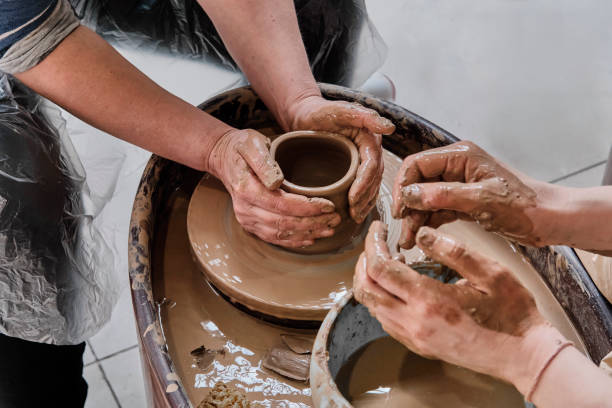Finding Work-Life Balance through Engaging Hobbies
Hobbies for Stress Relief
When it comes to finding a work-life balance, engaging in hobbies can be a great way to relieve stress and recharge your batteries. Hobbies provide an opportunity to disconnect from work, focus on something you love, and find joy outside of your professional life. Whether it's painting, gardening, playing a musical instrument, or hiking in nature, there are endless hobbies that can help you find peace and tranquility.

Engaging in creative hobbies, such as painting or drawing, can be particularly beneficial for stress relief. Artistic activities allow you to express your emotions, channel your energy, and engage in mindfulness. They provide a sense of fulfillment and can serve as a form of therapy, allowing you to relax and escape from the demands of your work life.
Outdoor hobbies, like gardening or hiking, can also be incredibly effective in reducing stress levels. Spending time in nature has been proven to improve mental health, reduce anxiety, and boost overall well-being. Being outdoors allows you to disconnect from technology, breathe in fresh air, and appreciate the beauty of the natural world. Whether you have a green thumb or simply enjoy exploring new trails, these hobbies offer a perfect opportunity to find balance.
Work-Life Balance Tips
While engaging hobbies can help you find work-life balance, it's important to incorporate additional strategies into your daily routine. Here are some tips to help you achieve a healthy balance between your personal and professional life:
1. Set Boundaries
Establish clear boundaries between work and leisure time. Define specific hours for work and make sure to unplug once you reach the end of your workday. Avoid checking emails or taking work-related calls during your personal time, as this can lead to burnout and prevent you from fully enjoying your hobbies and personal life.
2. Prioritize Self-Care
Make self-care a priority in your life. Take care of your physical and mental well-being by incorporating activities such as exercise, meditation, and relaxation techniques into your routine. Taking care of yourself will not only improve your overall health and happiness but also enhance your productivity and ability to handle work-related challenges.

3. Delegate and Seek Support
Learn to delegate tasks and ask for support when needed. Trying to do everything on your own can lead to overwhelm and prevent you from finding a healthy balance. Whether it's asking for help at work or enlisting the support of friends and family in your personal life, delegating responsibilities allows you to free up time for your hobbies and other activities that bring you joy.
4. Plan Your Week
Take the time to plan your week in advance. By creating a schedule and prioritizing your tasks, you can ensure that you allocate enough time for both work and hobbies. This will help you avoid overcommitting and feeling overwhelmed, allowing you to enjoy your leisure time guilt-free.
5. Practice Mindfulness
Embrace mindfulness in your daily life. Engage in activities that promote present-moment awareness, such as yoga or meditation. These practices can help reduce stress, increase focus, and improve overall well-being. By being fully present in each moment, you can better appreciate the time you spend on your hobbies and create a deeper sense of work-life balance.
Importance of Work-Life Balance
Work-life balance is crucial for maintaining good physical and mental health. It allows individuals to effectively manage their personal and professional responsibilities, leading to increased job satisfaction, improved relationships, and overall well-being. Here are some reasons why work-life balance is important:
1. Mental Health
Chronic work-related stress can take a toll on mental health. Balancing work with hobbies and personal time helps reduce stress levels, prevent burnout, and promote overall mental well-being. Engaging in hobbies provides an outlet for relaxation, self-expression, and creativity, allowing individuals to recharge and focus on their personal passions.
2. Physical Health
Overworking and neglecting personal needs can have negative effects on physical health. Finding time for hobbies and leisure activities helps individuals incorporate exercise, outdoor activities, and other health-promoting behaviors into their routines. Engaging in physical activities not only improves fitness but also boosts energy levels and reduces the risk of health issues associated with a sedentary lifestyle.
3. Improved Productivity
Having a well-balanced life, including engaging hobbies, can actually enhance productivity in the workplace. Taking regular breaks and pursuing leisure activities refreshes the mind, increases creativity, and allows individuals to return to work with renewed focus and motivation. A well-rested and fulfilled person is more likely to perform well, meet deadlines, and produce high-quality work.
4. Enhanced Relationships
Work-life balance strengthens personal relationships and social connections. Spending quality time with family and friends outside of work not only improves the bond between individuals but also fosters a support system. By nurturing relationships and creating meaningful connections, individuals can find emotional support and a sense of belonging, leading to increased happiness and overall life satisfaction.
5. Increased Happiness
Achieving work-life balance through engaging hobbies ultimately leads to increased happiness and fulfillment. When individuals find time for activities they enjoy and prioritize their well-being, they experience a greater sense of purpose and satisfaction in life. Hobbies provide a source of joy, personal growth, and a means to achieve personal goals, all of which contribute to a happier and more balanced life.
Achieving Work-Life Balance
Striving for work-life balance requires conscious effort and commitment. Here are some additional steps you can take to achieve a healthy balance:
1. Learn to Say No
Don't be afraid to say no to additional responsibilities or commitments that may jeopardize your work-life balance. Understand your limits and prioritize tasks based on their importance and alignment with your goals. Remember, saying no to something that doesn't serve your well-being allows you to say yes to the things that truly matter.
2. Flexibility in the Workplace
If possible, explore options for flexible working arrangements, such as working from home or adjusting your schedule. Many organizations now recognize the benefits of offering flexible work options, as they contribute to employee satisfaction, retention, and productivity. Negotiating flexibility with your employer can help create a better work-life balance for you.
3. Unplug from Technology
Avoid the temptation to be constantly connected to work through your electronic devices. Set boundaries and establish designated technology-free periods during your day or week. By disconnecting from technology, you can fully engage in your hobbies, spend quality time with loved ones, and recharge your mind.
4. Use Your Vacation Time
Take advantage of your vacation time and use it to relax, recharge, and pursue your hobbies. Many people neglect to take time off due to work obligations or fears of falling behind, but vacations are essential for maintaining a healthy work-life balance. Use this time to disconnect from work, explore new hobbies, travel, or simply enjoy much-needed rest and relaxation.
5. Regularly Evaluate and Adjust
Regularly assess your work-life balance and make adjustments as needed. Recognize that achieving a perfect balance may not always be possible, and that priorities may shift over time. Stay flexible and be willing to adapt your routines and commitments to ensure that you continue to prioritize your well-being and engage in activities that bring you joy and fulfillment.
Remember, work-life balance is a journey, not a destination. It requires active effort, self-awareness, and ongoing adjustments. By incorporating engaging hobbies into your life, setting boundaries, and prioritizing self-care, you can find the equilibrium that allows you to thrive both personally and professionally.





